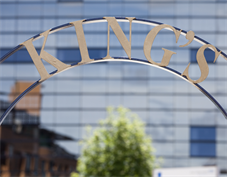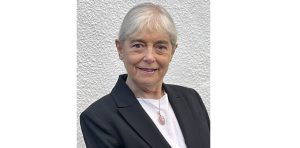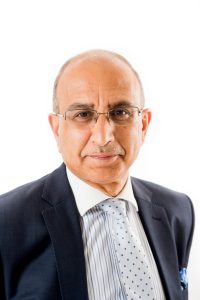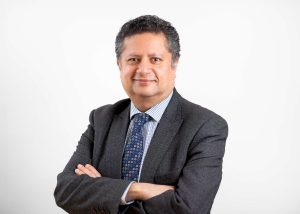New Year Honours for King’s staff
31 December 2024 - Three members of staff from King’s College Hospital NHS Foundation Trust have been recognised in the 2025 New Year Honours List.

Professor Stephanie Amiel, Honorary Consultant in Diabetes at King’s, has received a Damehood for services to people living with diabetes.
Meanwhile Professor Safa Al-Sarraj, Consultant Neuropathologist, has been awarded an OBE (Order of the British Empire) for services to neuropathology.
And Professor Keyoumars Ashkan, Consultant Neurosurgeon, has been made an MBE (Member of the Order of the British Empire) for services to neurosurgery.
‘Extraordinary contributions’
Professor Clive Kay, Chief Executive of King’s College Hospital NHS Foundation Trust, welcomed the news, and said:
“I am truly delighted for my colleagues, who have received well-deserved recognition for their extraordinary contributions to the fields of diabetes, neuropathology and neurosurgery.
“King’s, and the wider NHS, is full of committed people doing superb things for patients every day, and honours such as these help to inspire everyone working in healthcare.”
Professor Dame Stephanie Amiel

Stephanie Amiel
Professor Dame Stephanie joined the diabetes team as a consultant at King’s in 1995, since when she has introduced a number of new programmes for people with diabetes, ranging from structured education to islet cell replacement.
She introduced islet transplantation to the NHS to treat those with type 1 diabetes and severe hypoglycaemia (low blood sugar episodes), making King’s the first centre in the UK to successfully transplant a patient in the national programme.
Professor Dame Stephanie served as clinical lead for diabetes at King’s, and her leadership of the diabetes centre has made it an internationally recognised centre of excellence, with a particular focus on the interaction between mental and physical health in diabetes. She had a particular interest in preventing low blood sugar levels among her patients, and found novel treatment approaches not only improved their hypoglycaemia problems but also their mental wellbeing.
Reflecting on her clinical career, Professor Dame Stephanie said, “I’m very proud of the way in which the clinical team at King’s works together to deliver the very best care to people with diabetes, it’s very much a collaborative effort, both across disciplines in the diabetes group and with people from other clinical specialities.
“As a cohesive team, we were – and still are – one of the early adopters of technology for people with type 1 diabetes, improving the quality of life of patients living with the condition.
“I am also very proud of our outcomes for pregnant women with type 1 diabetes. Together with the patients, our own team and the obstetrics and midwifery team, we were very strict on glucose control from early on, and if this wasn’t being managed at home by our patients, we would bring them (briefly) into the hospital. In a clinical audit, our type 1 diabetes patients had the same outcomes as women without diabetes, which was a real achievement,” she added.
Professor Dame Stephanie, who is also Emeritus Professor of Diabetes Research at King’s College London, played a pivotal role in developing the Dose Adjustment for Normal Eating (DAFNE) patient education programme, reducing diabetes emergencies and the cost of emergency care by more than 60%, leading to a cost-effective standard of care across the UK, Ireland and internationally.
Professor Dame Stephanie’s work on the impact of ethnicity has also illuminated aspects of diabetes care in minority groups, with a focus on African and Caribbean communities in London. She has chaired the National Institute for Health and Clinical Excellence (NICE) type 1 diabetes guideline development group, shaping the current delivery of diabetes care in the 21st century.
Talking about her Damehood, she said, “This honour has come as a complete surprise to me – of course I am delighted. So much of what I have been able to achieve has been in collaboration with amazing colleagues and this award honours them too.
“To receive the honour for services to people with diabetes is heartwarming and humbling. They are the true heroes in the diabetes story and if I have been able to make things a little better for some of them, that is an honour indeed.”
Professor Safa Al-Sarraj, OBE

Professor Safa Al-Sarraj
Professor Safa Al-Sarraj joined King’s in 1995, and has been Head of Clinical Neuropathology and Director of the Brain Bank since 2002.
He is a distinguished figure in the field of neuropathology, recognised globally for his contributions to the understanding of neurological diseases, including dementia, neurodegeneration, traumatic brain injury and brain tumours. His ground-breaking work has had a profound impact on both clinical practice and research, particularly in advancing comprehension of brain pathology.
Professor Al-Sarraj is renowned for his research on neurodegenerative disorders, such as Alzheimer’s disease, Motor Neuron Disease and frontotemporal dementia. His research has helped to explain the underlying mechanisms of these conditions.
One of his most notable areas of research is in traumatic brain injury (TBI). Professor Al-Sarraj has investigated the long-term effects of head trauma on the brain, including the development of chronic traumatic encephalopathy (CTE), a degenerative disease found in individuals who have suffered repeated head injuries. His work in this area has been crucial in linking TBI with subsequent neurodegenerative conditions, providing critical insights that have informed both medical understanding and public health policies, particularly in sports and the military.
In addition to his clinical research, Professor Al-Sarraj has made significant contributions to the understanding of neuro-inflammation, a process that is increasingly recognised as a key factor in many neurological diseases. His studies have helped clarify how inflammatory responses in the brain can contribute to both the progression of neurodegenerative diseases and acute neurological damage, providing potential avenues for therapeutic intervention.
In his clinical practice, Professor Al-Sarraj has contributed to the understanding of genetic mechanisms in the development of brain tumours, and introduced various new technologies in the genetic diagnosis of brain tumours.
Beyond his research, Professor Al-Sarraj has also been a pivotal figure in academic and medical leadership, and he has helped foster a new generation of neuropathologists, ensuring the field continues to advance in both academic and clinical spheres.
Another significant aspect of Professor Al-Sarraj’s career is his work in forensic neuropathology. He has been involved in numerous high-profile forensic investigations, using his expertise to provide crucial insights into causes of death and the effects of trauma on the brain.
His forensic work often intersects with his research on traumatic brain injury, as he examines cases of sudden death that involve head trauma or unexplained neurological decline. His contributions in this area have been particularly valuable in the context of legal investigations, where his analyses have been used to inform court cases and public inquiries. His forensic work has not only highlighted the importance of neuropathology in legal contexts but has also underscored the broader societal implications of brain injuries and neurological diseases.
Commenting on his OBE, Professor Al-Sarraj said, “The news of an OBE came completely out of the blue. I am both surprised and delighted to receive this honour, which I feel is not only for me but for everyone in the Department of Clinical Neuropathology and brain bank at King’s College Hospital and King’s Neuroscience centre.”
Professor Keyoumars Ashkan, MBE

Professor Keyoumars Ashkan
Professor Keyoumars Ashkan was appointed as a consultant neurosurgeon at King’s in 2006 and is now the lead for Functional and Oncological Neurosurgery.
His expertise in brain tumour surgery, as well as deep brain stimulation for conditions including movement disorders, are recognised nationally and internationally, attracting patients for treatment, peer requests for opinions and fellows for training from all around the world.
He is the academic neurosurgery lead and Co-Chair of the Neuroscience Research Delivery Unit at King’s. He is an Elected Council Member of the Society of British Neurological Surgeons and the Immediate Past President of the British Society for Stereotactic and Functional Neurosurgery.
Professor Ashkan led the Glioma Genomics England Clinical Interpretation Partnership Section of the 100K Genomes Project, and was the Chair of the Neurosurgical Special Interest Group of the International Parkinson and Movement Disorder Society.
Despite his busy clinical commitments, as a Professor of Neurosurgery at the Institute of Psychiatry, Psychology & Neuroscience as well as the School of Biomedical Engineering & Imaging Sciences at King’s College London, Professor Ashkan has led dozens of ground-breaking research studies culminating in almost 400 peer reviewed publications and multiple prizes and awards. His work on brain cancer vaccines received the top presentation award by the British Neuro-Oncology Society in 2022 and promises to impact the care of patients with brain tumours worldwide.
In 2020, his innovative approach to removing a brain tumour whilst his patient played the violin attracted a global audience and put neurosurgery at the forefront of the public mind.
In 2018, he was voted Clinician of the Year nominated by the Brain Tumour Charity and in 2021 he was the runner-up for the UK Ground-Breaking Pioneer Award. Together with his team, he secured designation as a Tessa Jowell Centre of Excellence for the neuro-oncology service at King’s in 2021. In 2023, he was awarded a Doctor of Science degree, the highest academic degree in the UK, for his innovative work on deep brain stimulation for Parkinson’s disease.
Professor Ashkan works closely with multiple charities to advocate for patients and their needs both at King’s and across the country. In his spare time, he is a keen pianist, with a degree in music, and was part of the King’s recording of “O Holy night” released in Christmas 2020 to uplift the nation’s spirits during the Covid pandemic.
Talking about his MBE, Professor Ashkan said, “In life, I have only ever done things because I felt they needed to be done. It is, however, very comforting and joyful to be acknowledged. To receive such an Honour is truly beyond my expectations and fills me with immense pride and gratitude.”
